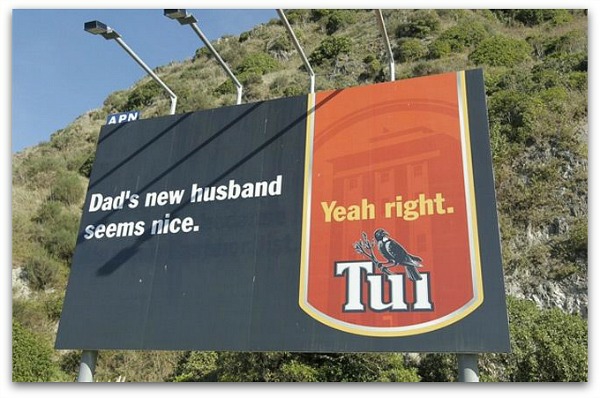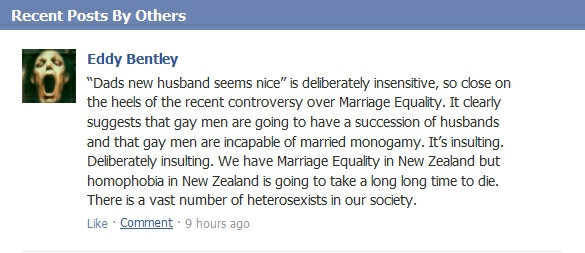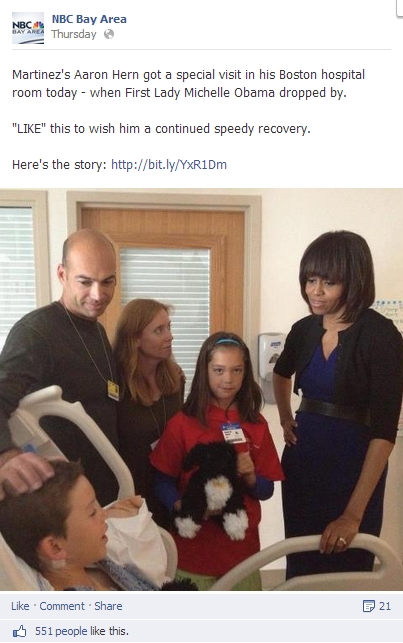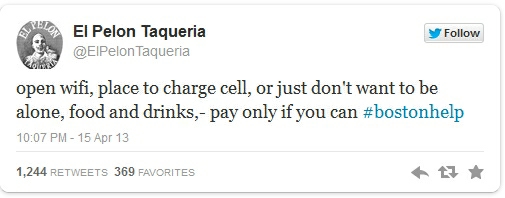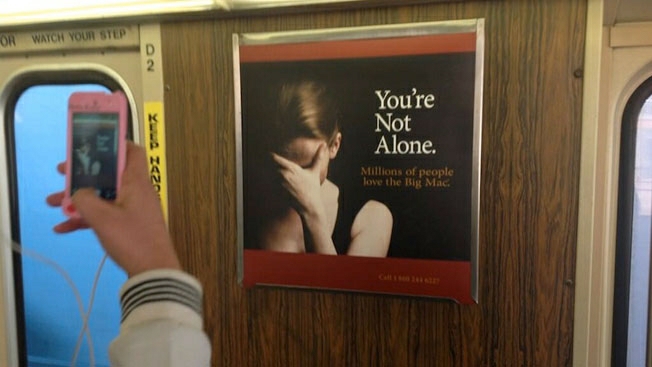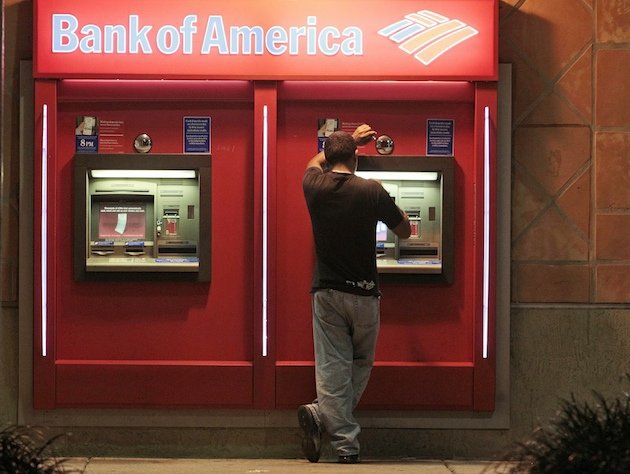Anti-Gay Marriage or Just Anti-Relationship?
Beer brewer Tui posted a billboard in response to New Zealand's legalization of same-sex marriage. It's meant to be funny but has caught a negative reaction.
Controversy is brewing (sorry) on the Tui's Facebook page, but the company is defending the ad.
Tui's marketing manager said that "Yeah right" ads have been around since 1994:
"There have been a fair few 'Yeah Right' lines which have made it to the billboards over this time, all of which have been generated with the intention of delivering a smile to New Zealanders.
"Given the duration of this campaign and the quantity of 'Yeah Right' lines, occasionally there is the odd... line, which doesn't hit the mark in generating a smile for all.
"Our intention with the current Tui Yeah Right billboard 'Dad's new husband seems nice' was to highlight the common situation or uncertainty experienced when someone's parent remarries.
"Given the recent passing of the Same Sex Marriage Bill in Parliament, this 'Yeah Right' line is a topical spin at the age-old situation of a parent's new partner."
It's true: Tui has a long history of edgy "Yeah Right" ads. Here are 16 others.
Discussion Starters:
- What's your view of Tui's ad: tasteless, insensitive, funny, or something else?
- Look at Tui's other "Yeah Right" ads. Do you find them funny? Does this context change your perception of the gay-marriage ad?
Nike Pulls "Boston Massacre" T-Shirts
A "Boston Massacre" T-shirt showing splattered blood stains will mean only one thing to people now: the bombing tragedy at the Boston Marathon. But this Nike T-shirt is a reference to the Red Sox/Yankees baseball games in 1978 and 2006.
Still, some people feel the T-shirts should have been removed from the outlet store before being spied (and photographed) by a producer for the "David Letterman Show."
A Nike spokesperson emailed a response to the Huffington Post:
"The shirts being referenced are older baseball shirts that were predominantly being sold through our Factory Stores Outlets. In light of the tragedy in Boston we took immediate action last week to remove this product from distribution. We conducted this process as quickly as possible and are confident the product has been removed from distribution."
The situation is reminiscent of Nike T-shirts in a Boston store window sporting slogans such as "Dope" and "Get High." In this situation, the mayor of Boston wrote a complaint letter, but the company denied that it promoted drug use.
Discussion Starters:
- In what ways does the "Boston Massacre" T-shirt differ from the "Dope" and "Get High" T-shirts? How are they similar?
- How do you assess Nike's response? Should the company have done anything differently, or is this an understandable mistake?
President Obama Cracks up Correspondents
After making an entrance to rap music, President Obama started the 2013 White House Correspondents' Dinner with the usual banter: "I look in the mirror and say, 'I'm not the strapping young Muslim Socialist that I used to be.'"
Here are a few more highlights from the president's speech: 
- Joking about his diminishing basketball skills: "I took 22 shots, made two of them. Two hits, 20 misses. The executives at NBC asked, 'What's your secret?'"
- Considering ways to increase his popularity, the president showed a series of photos sporting Michelle-like bangs.
- Poking fun at CNN: "I know CNN has taken some knocks lately, but the fact is, I admire their commitment to covering all sides of the story, just in case one of them happens to be accurate."
- Commenting on ads by the Las Vegas Sands Corporation CEO: "Did you know that Sheldon Adelson spent $100 million of his own money last year on negative ads? You've got to really dislike me to spend that kind of money. I mean, that's Oprah money. … Sheldon would have been better off offering me $100 million to drop out of the race. I probably wouldn't have taken it, but I'd have thought about it. Michelle would have taken it."
- Reacting to his relationship with the Republicans: "Some folks still don't think I spend enough time with Congress. ‘Why don't you get a drink with Mitch McConnell?' they ask. Really? Why don't you get a drink with Mitch McConnell?"
Discussion Starters:
- How does the president's delivery support the tone of his speech? What, specifically, do you notice him doing during some of his jokes?
- When the president switches to a serious tone, how does his delivery change? Again, what do you notice in his voice tone, gestures, facial expressions, and so on?
Hyundai's Ad Mocking Suicide: Not Funny
Hyundai is apologizing for an ad that pokes fun at a failed suicide attempt. Proud of its new ix35 model that uses water rather than carbon monoxide emissions, the company played on a way that some people end their lives. But the ad didn't go over well, particularly for one woman, who lost her dad to this method of suicide.
Holly Brockwell wrote a touching blog post about her father's suicide and how the ad affected her. As a creative advertising director, Brockwell has good credibility for her reaction: 
"I understand better than most people the need to do something newsworthy, something talkable, even something outrageous to get those all-important viewing figures. What I don't understand is why a group of strangers have just brought me to tears in order to sell me a car. Why I had to be reminded of the awful moment I knew I'd never see my dad again, and the moments since that he hasn't been there. That birthday party. Results day. Graduation."
Brockwell also posted her father's suicide note, which has gone viral.
A week before Brockwell's blog post, AdWeek had criticized the ad. Apparently, a reporter contacted Hyundai but received no response. That was a warning the company should have heeded.
Now, after more bad press, Hyundai has pulled the ad from YouTube and issued these statements:
Hyundai Motor America Statement:
"We at Hyundai Motor America are shocked and saddened by the depiction of a suicide attempt in an inappropriate European video featuring a Hyundai. Suicide merits thoughtful discussion, not this type of treatment."
Hyundai Motor Company Statement:
"Hyundai Motor deeply and sincerely apologizes for the offensive viral ad.
"The ad was created by an affiliate advertising agency, Innocean Europe, without Hyundai's request or approval. It runs counter to our values as a company and as members of the community. We are very sorry for any offense or distress the video caused. More to the point, Hyundai apologizes to those who have been personally impacted by tragedy."
Discussion Starters:
- Hyundai's defense is similar to McDonald's, which was criticized for the subway ad mocking mental illness: the ads were created "without Hyundai's request or approval." Do you buy it?
- We haven't seen a response from Innocean, the ad agency. What, if anything, should they do?
E-Board Member Embarrasses Her Sorority
An executive board member of the Delta Gamma sorority at the University of Maryland let the entire sorority know how she felt in a scathing, obscenity-filled email. In her rant, she accuses her sisters of being boring, awkward, weird, stupid-and worse.
Apparently, the last straw was an event with Sigma Nu fraternity, during which some sisters weren't at their best. Still, one wonders whether their behavior was so egregious as to deserve being threatened: "I will...assault you."
One of the great ironies of the email is her concern about the sorority's image:
"Seriously, if you have done ANYTHING I've mentioned in this email and have some rare disease where you're unable to NOT do these things, then you are HORRIBLE, I repeat, HORRIBLE PR FOR THIS CHAPTER."
The president of the University of Maryland chapter responded:
Discussion Starters:
- Assess the chapter president's response? What works well, and what could be improved?
- Should the email author also respond? If so, what should she say?
- How, if at all, do you think this incident reflects on Sigma Nu? Should the fraternity do anything in response?
Ethical Social Media Marketing After the Boston Bombings
An article by Augie Ray, director of social media for a Fortune 100 company, describes the ethics of social media marketing, and gives us several interesting examples from the Boston Marathon tragedy. In contrast to these companies that perhaps crossed an ethical line, recall El Pelon Taqueria, the restaurant that offered help and asked for nothing in return.
Calling it a "desperate attempt to trade on people's feelings," Ray described an NBC Facebook picture of a boy in a hospital bed. The post asks people to "'LIKE' this to wish him a continued speedy recovery." Ray points out that "liking" a post does nothing to help the boy recover.
In another example, Ray criticizes Ford for muddying a message with its products. According to Ray, "Ford's use of brand imagery not only reduced the sincerity of the message but demonstrated questionable ethics." For comparison, Ray presents Ford's actual post, at right, next to one without branding, at left. The difference is fairly obvious.
Individuals made mistakes as the tragedy was unfolding, too. Author Guy Kawasaki was criticized for continuing to post promotional tweets, as others were suspending theirs. Clearly, he didn't agree with the criticism. He responded, "Loving how people with less [sic] than 1,500 followers are telling me how to tweet."
Discussion Starters:
- How do you assess these three situations? Do you agree with the criticism of each?
- Augie Ray offers a sound suggestion for modifying the Ford post. Can you think of something similar for the NBC post? What might make this one more acceptable (read: more compassionate)?
False Tweet Rocks the Stock Market
A fake tweet on Associated Press's Twitter feed sent the blue-chip Dow down about 145 points in two minutes. The market quickly recovered, but the incident reminds us how reactive we are to potentially false information.
Associated Press confirmed that its feed had been hacked, although no individual or group has yet taken responsibility. The false tweet is below.
This is certainly not the first case of hacking. Facebook and Twitter both admitted security breaches over the past few months. In a February blog post, Twitter outlined plans to improve security.
Discussion Starters:
- What are the ethics of this situation? Analyze the behavior of those who acted and those affected.
- Are the hackers responsible for the effect of the tweet, or should investors be smarter about using information to make trades?
More Data on Social Recruiting
 The Society for Human Resource Management published a new study confirming much of what we know about social recruiting and offering some surprising data, too.
The Society for Human Resource Management published a new study confirming much of what we know about social recruiting and offering some surprising data, too.
It's no surprise that most of the 651 respondents, whose job includes staffing, use LinkedIn, Facebook, and Twitter-in that order-to find "passive" job candidates. This is consistent with other survey data in the past couple of years. Eighty percent of respondents use these sites; those who don't cite legal concerns, such as finding out someone's age.
A surprising 57% of companies don't have policies in place for using social networking sites to screen candidates, and 72% have no intention of establishing a formal policy within the next 12 months.
Discussion Starters:
- Why don't companies have a policy for screening candidates online? What are the potential drawbacks of creating a policy?
- What are the potential ethical considerations of screening candidates on LinkedIn, Facebook, and Twitter? How do these three sites differ as screening tools?
Carnival Updates Guests with "Improvement" Plans
In a letter from CEO Gerry Cahill, Carnival tries to restore guests' confidence in the brand after several technical and other issues on ships during the past few months. In addition to this letter, Carnival has posted a video on YouTube and created a News and Updates page on Facebook.

In some respects, the letter is a confusing mess. Although the $300 million is more clearly explained in the video, this letter makes it sound as though Carnival is buying hotels: "$300 million to expand the availability of hotel services." Cudos to having some of the main point upfront ("Our goal is to drive continual improvement across all aspects of our customer experience"), but isn't much of the main point at the end, where Cahill thanks guests for their loyalty?
Also, the letter seems overly jargony for typical Carnival guests. The company just wants them to book another cruise, right? The encouragement could be clearer and more direct.
Discussion and Assignment Ideas:
- Compare Carnival's guest letter, video, and Facebook page. What differences do you see, and how do you account for them; for example, what are the audiences for each?
- Rewrite the Carnival letter. How can you improve the content, organization, and tone?
Student's Letter Stirs Up Controversy
Like many high school seniors, Suzy Lee Weiss is receiving her share of college rejection letters. Disappointed-and clearly more than a little peeved-Weiss published a letter in The Wall Street Journal, "To (All) the Colleges That Rejected Me."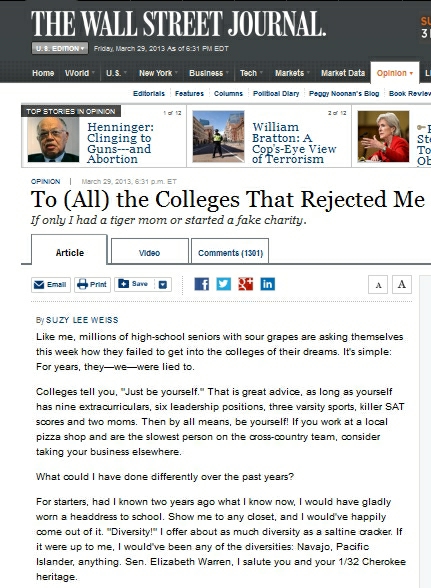
Weiss claims that her 4.5 GPA, 2120 SAT score, and experience as a U.S. Senate page weren't good enough. Partly, she blames her lack of diversity:
"For starters, had I known two years ago what I know now, I would have gladly worn a headdress to school. Show me to any closet, and I would've happily come out of it. 'Diversity!' I offer about as much diversity as a saltine cracker. If it were up to me, I would've been any of the diversities: Navajo, Pacific Islander, anything. Sen. Elizabeth Warren, I salute you and your 1/32 Cherokee heritage."
Jokingly, Weiss also blames her parents and uninflated job titles.
A student who claims "I took your spot at Harvard," wrote a snarky response to Weiss, including,
"But when my parents got divorced and my mom came out of the closet and hooked up with the ¼ Navajo lady neighbor, I closed my textbooks and put down my pen. I figured-why bother? I'm a black female from the inner city with divorced parents, a gay mother, and a part-Native American stepmother. Every college was going to recruit me like I had a great jump shot. . . .
"As for me-I'm set for life. Obama is president, racism has ended, and law schools have already come a-callin."
Discussion Starters:
- Although Weiss says it's just satire, some people read the piece as cynical and bitter. Are you with the 53% of Today Show viewers who said the letter was whiny? What's your view?
- Watch Weiss on the Today Show. How, if at all, does this change your opinion of her?
Restaurant Offers Help During Boston Marathon Explosions
Where companies failed during Hurricane Sandy, at least one business got "goodwill" right during the Boston Marathon explosions. El Pelon Taqueria offered runners and others affected a place to relax, eat, and charge a phone-whether or not they can pay.
The message was retweeted 1244 times.
The owner's Twitter feed compliments the restaurant staff, working hard to serve people in need-and perhaps others who just want a good meal and to support a business that offers genuine help.
- Compare El Pelon's approach to that of American Apparel's during Hurricane Sandy. If you were a consultant for companies, what guidelines would you suggest they follow during similar tragedies?
- Overall, how do you think El Pelon's sales will be affected this week? Make a prediction, and let's see whether we fnd articles written about the business in the next few days.
McDonald's Apologizes for Ad
McDonald's says it didn't approve an ad that makes light of a mental health issue. In a Boston subway ad, the company pokes fun at someone with an addiction to a Big Mac.
Nicole DiNoia, a spokesperson for McDonald's, issued this statement:
"A local print ad displayed on the Massachusetts Bay Transportation Authority (MBTA) was recently brought to our attention. We can confirm this ad was not approved by McDonald's. And, as soon as we learned about it, we asked that it be taken down immediately. We have an approval process in place, with our marketing and advertising agencies, to ensure that all advertising content is consistent with our brand values. Regrettably, in this incident, that process was not followed. We sincerely apologize for this error."
With no one taking responsibility, who's to blame? The response is reminiscent of the Ford ad that the company said it didn't approve. In that case, the ad agency did take responsibility for the offensive ads and terminated those involved. In this case, Arnold agency president Pam Hamlin apologized and blamed the process rather than the design:
"Arnold apologizes for its mistake to McDonald's and to anyone who was offended by the ad. McDonald's did not approve the ad, and its release was our unintended error. We've addressed the issue and have improved our approval process to ensure this does not happen in the future."
In the Ford situation, it was somewhat believable that the ad agency created the ads just to show its creativity. But this situation is different: the agency is hired by McDonald's but didn't get approval during any stage of ad development: concept development, composition, printing, or distribution?
Discussion Starters:
- What's your reaction to the ad? Do you find it offensive, funny, or something else?
- How do you respond to the apologies from McDonald's and the ad agency? What, if anything, could they do differently?
NYU Prof to Student: "Get Your Sh** Together"
An NYU professor's email response to a student is going viral. The dispute started when a student walked into Scott Galloway's brand strategy class an hour late, and the professor dismissed him based on a policy of not allowing students who arrive more than 15 minutes late to stay in the class.
The student wrote an email to Prof. Galloway, explaining his position:
Prof. Galloway,
I would like to discuss a matter with you that bothered me. Yesterday evening I entered your 6pm Brand Strategy class approximately 1 hour late. As I entered the room, you quickly dismissed me, saying that I would need to leave and come back to the next class. After speaking with several students who are taking your class, they explained that you have a policy stating that students who arrive more than 15 minutes late will not be admitted to class.
As of yesterday evening, I was interested in three different Monday night classes that all occurred simultaneously. In order to decide which class to select, my plan for the evening was to sample all three and see which one I like most. Since I had never taken your class, I was unaware of your class policy. I was disappointed that you dismissed me from class considering (1) there is no way I could have been aware of your policy and (2) considering that it was the first day of evening classes and I arrived 1 hour late (not a few minutes), it was more probable that my tardiness was due to my desire to sample different classes rather than sheer complacency.
I have already registered for another class but I just wanted to be open and provide my opinion on the matter.
Regards,
xxxx
-
xxxx
MBA 2010 Candidate
NYU Stern School of Business
xxxx.nyu.edu
xxx-xxx-xxxx
In response, Prof. Galloway took the opportunity to teach what some may call a life lesson:
From: scott@stern.nyu.edu
To: "xxxx"
Subject: Re: Brand Strategy Feedback
xxxx:
Thanks for the feedback. I, too, would like to offer some feedback.
Just so I've got this straight...you started in one class, left 15-20 minutes into it (stood up, walked out mid-lecture), went to another class (walked in 20 minutes late), left that class (again, presumably, in the middle of the lecture), and then came to my class. At that point (walking in an hour late) I asked you to come to the next class which "bothered" you.
Correct?
You state that, having not taken my class, it would be impossible to know our policy of not allowing people to walk in an hour late. Most risk analysis offers that in the face of substantial uncertainty, you opt for the more conservative path or hedge your bet (e.g., do not show up an hour late until you know the professor has an explicit policy for tolerating disrespectful behavior, check with the TA before class, etc.). I hope the lottery winner that is your recently crowned Monday evening Professor is teaching Judgement and Decision Making or Critical Thinking.
In addition, your logic effectively means you cannot be held accountable for any code of conduct before taking a class. For the record, we also have no stated policy against bursting into show tunes in the middle of class, urinating on desks or taking that revolutionary hair removal system for a spin. However, xxxx, there is a baseline level of decorum (i.e., manners) that we expect of grown men and women who the admissions department have deemed tomorrow's business leaders.
xxxx, let me be more serious for a moment. I do not know you, will not know you and have no real affinity or animosity for you. You are an anonymous student who is now regretting the send button on his laptop. It's with this context I hope you register pause...REAL pause xxxx and take to heart what I am about to tell you:
xxxx, get your shit together.
Getting a good job, working long hours, keeping your skills relevant, navigating the politics of an organization, finding a live/work balance...these are all really hard, xxxx. In contrast, respecting institutions, having manners, demonstrating a level of humility...these are all (relatively) easy. Get the easy stuff right xxxx. In and of themselves they will not make you successful. However, not possessing them will hold you back and you will not achieve your potential which, by virtue of you being admitted to Stern, you must have in spades. It's not too late xxxx...
Again, thanks for the feedback.
Professor Galloway
The professor told Business Insider that he's "getting an email about every three minutes from people (all over the world) voicing support/anger (about an 8:1 ratio)."
Discussion Starters:
- This email exchange is three years old. What took so long for it to go viral?
- What's your reaction to each email? How could both the student and the professor possibly have changed their behavior, language, or perspective?
Tweet for Jobs
We know that "social recruiting" is increasingly common, with 73% of employers responding to a Jobvite survey reporting that they have hired someone online. But how does this work on Twitter, through which 15% of the 73% had hired someone? The Wall Street Journal published an article that explains some of the recruiter's and job seeker's perspective.
 As funny as it seems to tweet your qualifications within 140 characters, more employers are encouraging people to respond to job postings on Twitter. Boston network-infrastructure firm Enterasys tried this approach and found success. The company's chief marketing officer said, "I am fairly certain I am going to abandon the resume process. The Web is your CV and social networks are your references."
As funny as it seems to tweet your qualifications within 140 characters, more employers are encouraging people to respond to job postings on Twitter. Boston network-infrastructure firm Enterasys tried this approach and found success. The company's chief marketing officer said, "I am fairly certain I am going to abandon the resume process. The Web is your CV and social networks are your references."
Other employers report following prospective candidates to evaluate their interactions. And in many situations, although the initial contact happens via tweets, candidates include links to more substantive resumes and social media profiles.
One optimist, Kathryn Minshew, founder of career website TheMuse.com, said that the tweet is "the new elevator pitch."
Discussion Starters:
- How optimistic are you about companies' recruiting via Twitter?
- How could you see publicizing your qualifications and career interests on Twitter? What are the potential downsides for you personally and professionally?
What Do Social Media Teams Look Like?
A Ragan/NASDAQ OMX Corporate Solutions survey of 2,714 communicators uncovered how organizations' social media teams are structured. This infographic, created by Go-Gulf.com, highlights a few interesting facts about those who completed the questionnaire:
- Only 27% have a dedicated social media team. (It would be interesting to know the size of the companies and industries.)
- 42% have only one person working on social media.
- Only 22% plan to hire more people to manage social media next year.
- 25% use interns for social media work.
Discussion Starters:
- What, if anything, surprises you about this data?
- How do you think these numbers might vary for hospitality, retail, technology, and other industries?
- If you could project out five years, how do you think this data might change? What are your predictions?
RBC Responds to Outsourcing Plans
The Royal Bank of Canada is under fire for replacing 45 employees with oversees workers. A representative of RBC admits that work is being moved to another supplier, and current employees are training their replacements. The company is looking for new jobs for the displaced workers, who will leave at the end of the month. The new supplier is iGATE Corp., an Indian multinational outsourcing firm.
In an interview, RBC HR chief Zabeen Hirji tried to explain that RBC isn't hiring the workers, and the workers aren't replacing RBC employees-just transitioning to the new staff. Both are tough sells. First, RBC hired the supplier who is hiring the workers (so they have some accountability). Second, having interim workers doesn't change the outcome: people are losing their jobs, and-as it appears-foreign workers will be doing the work. The reporter called the distinction "semantics" and said, "I get what you're trying to sell, but I'm not sure I'm buying it."
Criticism is high, particularly the concern that RBC is violating federal rules that foreign workers may not replace Canadian citizens. In response, the bank published a statement that said, "External suppliers with the right skills allow us to introduce new efficiencies, continually improve our service at reduced cost and reinvest in initiatives that enhance the client experience. Agreements with our suppliers include strict controls and ongoing monitoring to ensure full compliance with all regulatory requirements."
Public backlash is also high. A Facebook page, Boycott Royal Bank of Canada, has 7,600 likes.
Discussion Starters:
- Analyze Zabeen Hirji's interview. What does she do well, and what could be improved? What are her strongest and weakest arguments?
- Overall, do you buy RBC's position?
- One article referred to Hirji's "corporate-speak explanation and histrionic hand gestures." Do you agree with this characterization?
The IRS Doesn't Consider Emails Private
Strategizing with your accountant about how to avoid paying taxes? Asking your mom whether you really have to declare that research stipend? These conversations best not happen over email.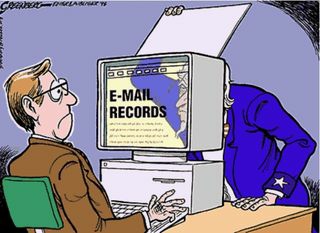
The IRS believes it can access taxpayer's emails without a warrant, according to a response to the American Civil Liberties Union (ACLU)'s asking for the agency's privacy policy. As a defense, the IRS seems to conjure the Electronic Communications Privacy Act (ECPA), which the ACLU calls "hopelessly outdated":
"It draws a distinction between email that is stored on an email provider's server for 180 days or less, and email that is older or has been opened. The former requires a warrant; the latter does not. Luckily, the Fourth Amendment still protects against unreasonable searches by the government."
Enacted in 1986, the Act doesn't account for where many people now store email: in the cloud. Similarly, the agency seems to claim that people have "no privacy expectation" for email stored on a server.
Although the IRS denies doing so, the agency may search social media sites for posts that may contradict some of the claims made on tax returns.
Discussion Starters:
- If the IRS did search and read your emails, what would it find?
- Does this news make you more cautious about what you might send over email? How so?
Lone Star College Communicates Stabbings
At least 14 students were stabbed on the Lone Star Community College campus near Houston, TX. One student critically injured two others, as he ran to different buildings, stabbing people with an Exacto knife. When the suspect, known only as "James," was tackled, he said, "I give up. I give up."
The college posted an emergency alert on its website, and the school went into lock-down, with students held in classrooms until more information was known.
The college told students, "Stay away from the area. Seek shelter in a secure location until the incident is resolved." This is sound advice and reminds us of Virginia Tech's emails during the 2007 shootings-although some of those messages came too late.
Discussion Starters:
- Assess the college's emergency web page. What works well, and what could be improved?
- What additional communications would you recommend that the college send to students, faculty and staff, alumni, and parents? What medium should be used for each group?
Coming Soon: Video Chat at Your ATM
Bank of America is adding what the company calls the "human touch of a teller" to the customer's ATM experience. In a statement, the company says that the service provides additional hours of personalized service for customers who need it:
"The new technology gives customers access to a range of services during extended hours to address their daily banking needs, and provides them with convenience, control and flexibility over how, when and where they bank. Using the new ATMs, customers can speak with a Bank of America teller via real-time video and receive the same quality of personal assistance they would if they walked up to a banking center counter."
The statement also says that ATMs in Boston will be the first equipped with the service, with other locations rolling out throughout 2013. In case you fear this will replace your beloved teller at the branch, Bank of America assures us, "Banking center tellers will still be available for customers who choose to conduct their banking transactions in person" (for the few diehards).
Discussion Starters:
- Who do you think will make most use of the voice chat service? Under what circumstances would you?
- What are the costs to Bank of America of implementing the new service (financial and other), and what are the benefits? What else do you think factored into the company's decision to offer this innovative service?
Carnival Responds to Yet More Ship Trouble
Are all of Carnival Cruise's recent ship problems unrelated? That's what the company would like the public to believe. Carnival's Triumph-which was stranded in Alabama last month-broke free from its moorings. Hurricane-link winds blew the ship from its anchors and threw two shipyard employees into the Mobile River. Although one man was found, another is still missing.
Although the crises are mounting for the cruise company, it's getting better at responding via social media. The company quickly tweeted about the situation and posted several updates throughout the day:
Carnival also posted this statement to its Facebook page:
April 3, 2013, 7PM ET
Earlier this afternoon, due to strong winds that reached speeds exceeding 70 miles per hour during a severe storm in Mobile, Ala., Carnival Triumph, which was in wet dock at a Mobile shipyard, broke away from its moorings. The ship drifted, and was secured.
With the assistance of tugboats on site, the ship has been moved to the Mobile Cruise Terminal. Lines have moored the ship, and, as a precaution, tugboats will remain alongside the vessel as well.
All of the approximately 600 crew and 200 contractors who were onboard the vessel are safe and have been accounted for through a roll call. There are no reports of injuries. While assessment of damage to the ship is ongoing, initial indications suggest the damage is limited.
According to reports, two shipyard employees on an adjacent pier fell into the water. One has reportedly been rescued by the U.S. Coast Guard and the search continues for the second. Our thoughts and prayers are with the missing shipyard employee and the family.
Discussion Starters:
- Assess Carnival's response on social media. How else is the company using Facebook and Twitter to communicate during this crisis?
- How can Carnival rebuild the brand and explain the recent incidents as separate and distinct from one another?


